What are the 10 most hated companies in America right now? In the last couple of months there have been many incidents of various magnitudes that affected the reputation of several big companies. Reputation is a very important thing for companies that interact with customers on their daily basis and tarnishing it might have big repercussions in form of lower sales, plummeting stock prices, or even in more extreme scenarios – a bankruptcy.
For years companies are investing millions in building their brands, their reputations and sometimes even a small blunder can set back the progress in a very short time. And it doesn’t even have to be something affecting the broader public like a price hike or data security issues. The public outrage can even be sparked by internal incidents that get reported in the media, such as sexual harassment allegations, unethical business practices, or a toxic work environment.
Corporate public relations departments spend their days making sure that a company is viewed as positively as possible and are ready to scramble and take under control any situation that might arise. Managing a company’s reputation has become increasingly more complex in the era of social media and Internet, since the spread of information is instant and reaches millions of people immediately, which makes containing a crisis impossible. So, how businesses react to a backlash and what actions they take to prevent it is more important than ever.
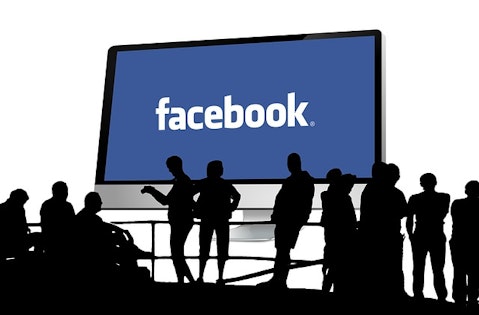
However, how important is customer satisfaction? Well, it turns out that in many cases it doesn’t really matter. In a study by Timothy Keiningham, Sunil Gupta, Lerzan Aksoy and Alexander Buoye titled “Understanding Your Customers: Customer Behavior”, it is shown that the relationship between satisfaction and spending among customers is very weak and often the return on investments in increasing customer satisfaction is very small or even negative. That seems counterintuitive, but when a company gets higher revenue from increased customer satisfaction it loses money on the investments it made to get that level of satisfaction, therefore the profit is small, or can even be negative. The authors of the study also suggest that it’s more important how customers rank a brand in relation to competitors.
Let’s get a couple of examples. It’s not a secret that big corporations are often driving smaller companies out of business. Amazon.com, Inc. (NASDAQ:AMZN) is particularly known for being ruthless. You might be outraged reading in a local newspaper how another small shop closed its doors because of Amazon. Then you go on Amazon and see that new TV with a 30% off and your outrage vanishes. Or look at Facebook, a company that actually ranks at the top of our list of most hated companies in America right now. The recent Cambridge Analytica scandal created a huge backlash and thousands of people went on Facebook to say how bad Facebook is. The irony is obvious.
Having said that, this brings us to another question. How does reputation affect a company’s stock price and do negative developments affect it? The same study, we mentioned earlier found that customer satisfaction have very little effect on the stock price, because the stock price is correlated with a company’s fundamentals and we have already mentioned that the revenue is almost unaffected by the customer satisfaction. Following the Deepwater Horizon Spill in 2010, BP plc (NYSE:BP)’s stock tanked, but in the following couple of months it recovered a big part of the decline. While the public was outraged and BP often ranks among the companies Americans hate the most, investors took their time and assessed the situation to understand how liquidating the consequences of the spill would affect the company’s profits. Or take Monsanto Company (NYSE:MON), a company that Americans love to hate (sometimes reasonably). In March, the World Health Organization said that glyphosate, the most widely used herbicide in the world, is probably carcinogenic. The stock inched down by 2% on the back of the news, but in a month it was back in the green territory.
In some cases, investing in companies that the public is known to hate can generate very strong returns. In a letter to investors dated February 2015, William Smead of Smead Capital Management pointed out that investors often pay a premium for popular companies, but “out of favor” stocks are discounted. These anomalies allow contrarian investors to generate alpha. As examples, Smead mentioned Comcast and eBay Inc (NASDAQ:EBAY), both of which were disliked by analysts and the public. Since February 2015, Comcast’s stock is up by 23%, while eBay Inc (NASDAQ:EBAY)’s shares surged by 87%. Smead added that to generate strong returns, one should consider investing in a company with a sticky customer base and an ongoing public dislike for a business.
With this in mind, we have compiled a list of 10 most hated companies in America right now. We took several criteria into account. For companies that interact with customers, we included their score on the American Consumer Satisfaction Index. We also made an editorial judgement regarding some of the most recent controversies surrounding these companies. We also took into account Google search trends by using the number of search results to the query that included the keyword “hate” and the company name. It may not be entirely accurate since Google search results include mentions over long periods of time, but it can give us an idea about a company’s reputation online.
10. H&M
Clothing companies always had a “loyal” group of haters accusing them of unethical business practices by using factories and labor force in third-world countries (often including children). And for years, these companies have been working hard and making promises to address this issue and to make their supply chains “more clean”. However, in January H&M faced backlash over an add that featured a black child wearing a hoodie with the words “coolest monkey in the jungle”. The company was accused of racism and quickly removed the hoodie from its collection. The outrage over the incident was pretty big online. Currently, searching for “hate H&M” shows 7.36 million results. However, it would be fair to point out that it’s more like a blunder rather than racism and H&M has much bigger issues that investors should be concerned about, like the $4.3 billion worth of unsold clothing that H&M mentioned in its latest quarterly report.
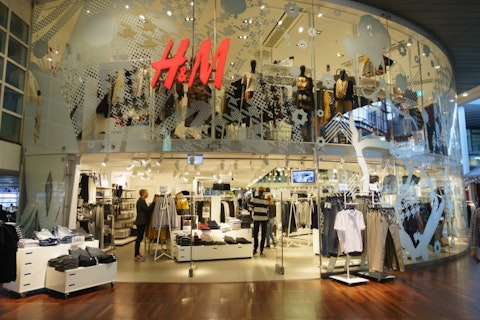
Sorbis / Shutterstock.com
9. United Airlines
People are often complaining about US airlines. Long lines, shrinking leg room and seat sizes (take a look at seven US airlines with widest seats in economy class), high fares are only few of the reasons for complaints. United Continental Holdings Inc (NYSE:UAL)’s United Airlines is far from being a favorite among US airlines. According to ACSI, it has a score of 70, five points below the average for US airlines and 12 points below JetBlue, which has the highest score of 82. Right now, searching for “hate United Airlines” yields 3.95 million. The airline had a major incident a year ago, when passenger David Dao was forcibly removed from the plane, because the flight was overbooked and United wanted to make room for four airline employees who needed to travel. During the confrontation with police officers, Dao hit an armrest and apparently lost conscience. A video of the incident went viral on social media, prompting the company to issue several statements and apologies, including from CEO Oscar Munoz. Politicians also expressed concerns over the incident.
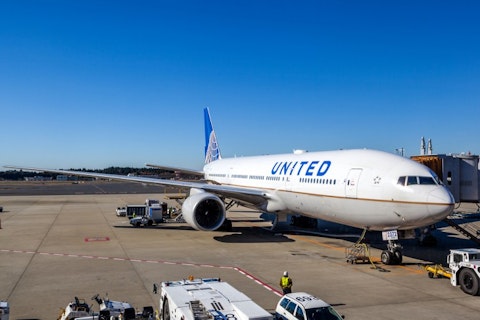
Ronnie Chua / Shutterstock.com
United Continental Holdings Inc (NYSE:UAL)’s stock lost over 4% between April 10 and April 18, although by the end of the month it recovered most losses and the following month it gained almost 12%.
8. Starbucks
Starbucks Corporation (NASDAQ:SBUX) recently found itself in hot water when a video went viral of two black men being arrested at one of its locations in Philadelphia earlier this month. One of the men asked to use the bathroom, but the staff told him that it’s for paying customers only. When an employee asked the other man if he wanted anything to drink, he explained that they are for a meeting and will be out quickly. After that, someone from the staff called 911 and police officers showed up, cuffed the men and took them out and into the squad car. Starbucks Corporation (NASDAQ:SBUX) CEO Kevin Johnson issued an apology following the backlash and the company said it plans to close all 8,000 company-owned stores in the US during the afternoon of May 29 to conduct a racial-bias education program.

Copyright: buschmen / 123RF Stock Photo
Again, while this incident is a singular even, there are people who hate Starbucks more consistently, so to say. There are currently 7.56 million mentions of “hate Starbucks” on Google search. Moreover, the company has an ACSI score of 77 (as of the end of 2017), two points below the average for the industry group. There are many reasons to dislike Starbucks, from forcing smaller competitors out of business by moving into an area with an existing coffee shop to having higher prices than other coffee shops. Nevertheless, Starbucks remains to be one of the largest and most popular coffee shop chains in the world. The recent incident slightly dented Starbucks Corporation (NASDAQ:SBUX)’s stock price, but it quickly bounced back.
7. CNN
Time Warner Inc (NYSE:TWX)-owned CNN gets lots of hate these days as it is consistently being targeted by President Donald Trump and his followers. Searching online for “hate CNN” shows 3.49 million results, which might be a lot, but wait until we get to Fox News, which also made our list of 10 most hated companies in America right now. Just earlier this month, CNN reported April Ryan said that she had received death threats after asking White House press secretary Sarah Huckabee Sanders whether Trump had considered resigning. The Trump’s base is not wasting time in accusing CNN of publishing “fake news” whenever something that doesn’t agree with their views go out. Nevertheless, Time Warner Inc (NYSE:TWX) is a big conglomerate with lots of businesses so the impact of how negatively a bunch of people view CNN doesn’t really affect it.

Copyright: flaz81 / 123RF Stock Photo
6. Yahoo!
Yahoo!, which is currently part of Verizon Communications Inc. (NYSE:VZ), gets a lot of hate over how it handled two major data breaches and still is one of the most hated companies in America even though the events in question happened over a year ago. In fact, searching Google for “Hate Yahoo!” shows a whooping 36.40 million results. Yahoo! reported the data breaches back in 2016, but the actual breaches occurred in 2013 and 2014. Initially, the company said that the hacking involved 1 billion user accounts, but in October 2017, Yahoo! said that all 3 billion accounts were affected. Both breaches are believed to be the largest in the history of the Internet to be discovered. Yahoo! was criticized for coming out with information regarding the hacking so late and formed CEO Marissa Mayer had to testify before the Congress, which launched an investigation. The company is also involved in several lawsuits and the development impacted Verizon Communications Inc. (NYSE:VZ)’s acquisition of Yahoo! by loweing the price by $350 million.

nevodka / Shutterstock.com
5. Fox News
Fox News, which is part of Twenty-First Century Fox Inc (NYSE:FOXA)’s Fox Entertainment Group, is another big media outlet that a big part of Americans hate. With 12.60 million search results for “hate Fox News” and a bunch of major incidents, it ranks on the fifth spot in our list of 10 most hated companies in America right now. In 2016, late Fox News CEO Roger Ailes resigned amid allegations of sexual misconduct. In 2017, Bill O’Reilly, a major star on Fox News, was revealed to having paid six women $50 million to settle sexual harassment lawsuits. After the reports, Fox News terminated O’Reilly’s employment. Moreover, Fox News is often accused of being a propaganda machine for the right, for the Republican Party and for President Trump. Most recently, Fox News host Tucker Carlson was made fun of online and on late-night television for talking about pandas and how aggressive and “sex-crazed” they actually are. It may be an important topic to talk about, but probably not so much on the same day when the FBI raided the home and office of Trump’s personal lawyer.

4. Wells Fargo
People hate Wells Fargo & Co (NYSE:WFC) and particularly so after the 2017 scandal involving fake accounts. In September 2016, it was discovered that Wells Fargo employees had been opening fraudulent accounts without clients’ consent since 2011. Clients were charged unanticipated fees and received unexpected debit or credit cards or lines of credit. The scandal led to the resignation of Wells Fargo & Co (NYSE:WFC)’s CEO John Stumpf and the dismissal of over 5,000 employees. Wells Fargo & Co (NYSE:WFC) also saw a mass exodus of clients with plummeting applications for credit cards and checking accounts in the following quarters. Wells Fargo & Co (NYSE:WFC) currently has an ACSI score of 74, which is close to the bottom of the ranking among banks.
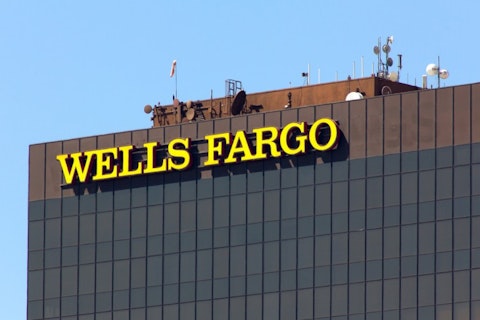
Ken Wolter / Shutterstock.com
Big banks were pretty much disliked by the public since the financial crisis happened. The scandal with fake accounts affected Wells Fargo & Co (NYSE:WFC)’s stock quite significantly, as lost 12% in September 2016. However, in November, Trump won the elections and investors assessed that the potential deregulations of the banking sector would bring much more benefits to the company, so they sent the stock higher.
3. Volkswagen
Once a synonym for quality and reliability, Volkswagen quickly became one of the most hated auto makers in the US. There are 7.64 million search results for the phrase “hate Volkswagen”. In September 2015, it was discovered that the company had been cheating at emission tests and its diesel cars actually released more nitrogen oxide gas than reported in testing. The company used programming software that enabled emissions controls only during laboratory testing. The magnitude of the discovery was huge as it affected millions of cars worldwide and not just Volkswagens. Other brands’ diesel vehicles were also tested and discovered to be using similar tricks, which led to more similar scandals.
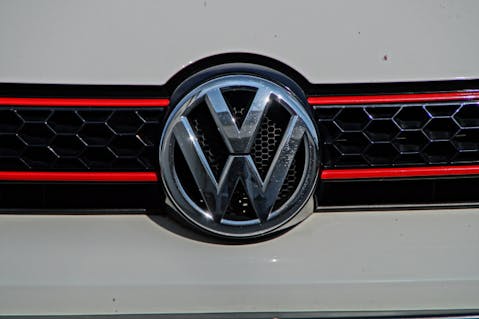
Pixabay/Public Domain
Following the “dieselgate”, Volkswagen’s stock price lost over a third of its value in the next couple of days. Volkswagen Group’s CEO Martin Winterkorn resigned and several high ranking managers were suspended. However, the stock price was not affected as much by the company’s breach of public trust and the damage to its brand as by the $18.32 billion that the company spent on rectifying it. Nevertheless, since the incident, Volkswagen’s stock price is over 60% in the green.
2. Trump Organization
Google search for “hate Trump Organization” yields 3.12 million results, which is not a lot compared to other companies featured on this list. However, there are a lot of Americans who hate Trump Organization and are right to do so. Since Trump became president, it seems like ethics were left outside the White House. Even though Trump made the impression of distancing himself from his business by putting it in a trust run by his two sons, the Trump Organization is still enjoying a lot of benefits on taxpayers’ money. Its current managers, Eric Trump and Donald Trump Jr. are enjoying Secret Service protection on overseas business trips. The President also often spends time at his private Mar-a-Lago club and the Secret Service agents and staff members that accompany him are staying in the rooms on the property, with taxpayers money going to Mar-a-Lago, and from there into Trump Organization. In addition, foreign governments on visits to D.C. often choose to stay at the Trump Hotel in an attempt to offer a sort of tribute to Trump.
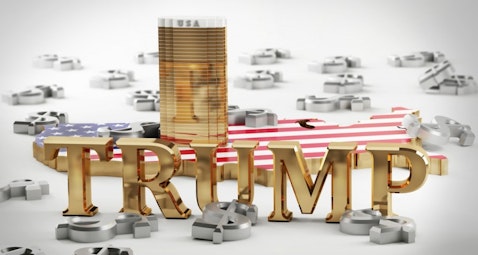
pespo/Shutterstock.com
1. Facebook
Finally, we have Facebook Inc. (NASDAQ:FB), which we believe deserves the top spot of among the most hated companies in America right now. There are 9.66 million results for “hate Facebook” and it’s highly likely that a high number of the mentions of the phrase are fairly recent. After being accused of allowing the spread of fake news that were used to influence the presidential election in the US and the Brexit vote, Facebook Inc. (NASDAQ:FB) has found itself in hot water when it was discovered that Cambridge Analytica, a London-based election consultancy, harvested data from millions of users that allegedly was used to influence voters. On April 10, Facebook Inc. (NASDAQ:FB) CEO Mark Zuckerberg testified before Congress, explaining how the misuse of data occurred and how Facebook is going to change the way it handles its users’ information.
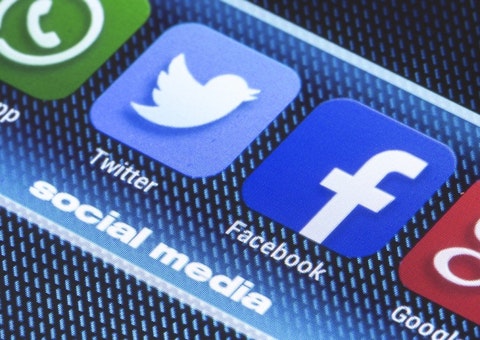
Quka / Shutterstock.com
Since the news broke out, Facebook Inc. (NASDAQ:FB)’s stock plunged by over 11% in the following week and it still hasn’t recovered. Analysts expressed concerns that the data privacy issues might led to some hesitancy among advertisers and active user figures might decline in the short-run. However, many also believe that a lot of the decline is due to hype and argue that despite all the issues Facebook Inc. (NASDAQ:FB)’s financial position is very strong and it will continue to generate cash over the long run. Since the news about the Cambridge Analytica scandal broke out, analysts covering the stock issued updates, most reiterating bullish ratings and some only lowering their price targets.
Disclosure: none





